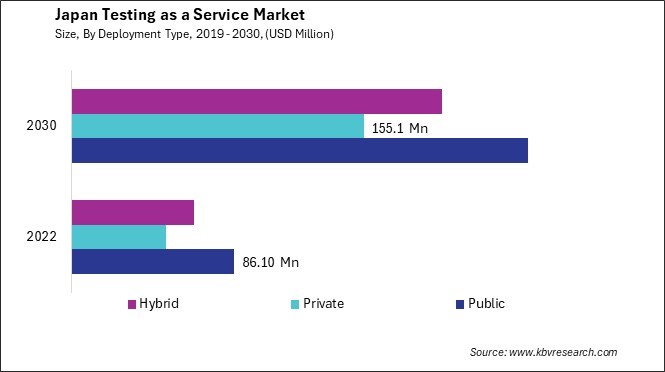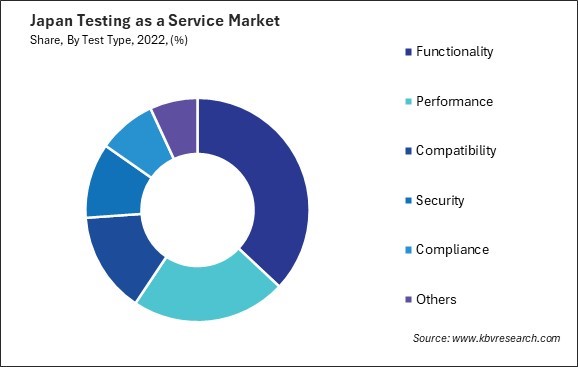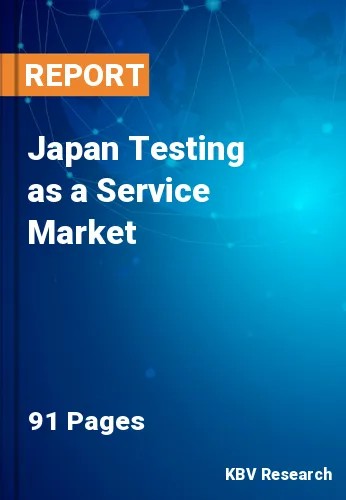The Japan Testing as a Service Market size is expected to reach $594.1 Million by 2030, rising at a market growth of 14.6% CAGR during the forecast period.
Japan's testing as a service market has witnessed significant growth and evolution in recent years, driven by the increasing demand for efficient and reliable software testing solutions across various industries. One of the key drivers of the testing as a service market in Japan is the country's robust and technologically advanced IT infrastructure. With a strong emphasis on digital transformation, Japanese enterprises increasingly rely on software applications to streamline their operations.

Furthermore, Japan's finance sector, known for its precision and attention to detail, has embraced testing as a service to ensure the reliability and security of financial software systems. With an increasing number of financial transactions being conducted online, there is a heightened focus on cybersecurity testing within this industry. Testing as a service provider in Japan addresses these concerns by offering cutting-edge testing solutions that safeguard sensitive financial data.
The rise of cloud computing and the adoption of cloud-based testing services in Japan contribute to expanding the testing as a service market. Japanese businesses are leveraging the flexibility and scalability of cloud-based testing solutions to meet varying workloads and testing requirements. Quality assurance in the gaming industry is another niche area driving demand for testing as a service in Japan. With Japan being a global hub for gaming and entertainment, there is an increasing need for comprehensive testing of gaming applications to deliver a seamless and immersive user experience. Testing as a service provider in Japan is tapping into this industry by offering specialized testing services catering to the unique challenges of the gaming industry.
Japan's automotive industry is undergoing a transformative phase, marked by a significant expansion into the testing as a service market. This shift is driven by Japan's commitment to innovation, quality, and safety in the automotive sector. As a global leader in automotive manufacturing, Japan recognizes the importance of rigorous testing methodologies to ensure the reliability and performance of vehicles. One key factor contributing to the expansion of testing as a service in Japan's automotive industry is the growing emphasis on autonomous and connected vehicles. With a keen focus on developing cutting-edge technologies, Japanese automakers increasingly rely on testing as a service solution to validate the functionality and safety of these advanced systems in Japan.
The testing as a service market in Japan also reflects a commitment to environmental sustainability. As the automotive industry transitions towards electric vehicles (EVs) and hybrid technologies, extensive testing becomes imperative to optimize energy efficiency, battery performance, and overall vehicle reliability. Testing as a service provider plays a crucial role in assisting Japanese automakers in this transition, conducting comprehensive tests to validate the eco-friendly credentials of their vehicles.
According to the Japan Automobile Dealers Association (JADA), in 2020, the automotive industry witnessed a remarkable surge in the sales of new electric vehicles, reaching nearly 1.4 million units in Japan. This substantial increase marked a noteworthy shift, with new electric vehicles accounting for 36.2% of the total new car sales, up from 35.2% in 2019. Notably, a significant portion of the newly sold electric vehicles in 2020, totaling 97.8%, comprised Hybrid Electric Vehicles (HEVs). This was followed by Plug-in Hybrid Electric Vehicles (PHEVs) at 1.1%, Battery Electric Vehicles (BEVs) at 1.1%, and Fuel Cell Electric Vehicles (FECVs) at 0.1%. This trend underscores a growing preference for electric vehicles in the automotive industry. Expanding on this paradigm shift, a parallel growth is observed in the testing as a service market within the automotive industry in Japan.
Furthermore, the Japanese government's support and investment in research and development further fuel the growth of testing as a service in the automotive sector. Thus, Japan's automotive industry is experiencing a transformative phase driven by a commitment to innovation with a notable emphasis on testing as a service for autonomous, connected, and electric vehicles.
In recent years, Japan has witnessed a significant upswing in the emphasis on quality assurance (QA) and risk management within the testing as a service market. As the nation continues to be at the forefront of innovation, particularly in sectors like automotive, electronics, and robotics, there is an increasing need for robust QA processes to ensure the reliability and safety of these cutting-edge technologies.
According to the International Trade Administration, as of 2022, Japan held a dominant position in the global industrial robotics sector, with 45% of all industrial robots worldwide originating from Japanese companies. The year 2022 saw a remarkable surge in orders for industrial robots from Japanese manufacturers, reaching a record-breaking $7.35 billion, reflecting a 1.6% increase from the previous year. Concurrently, production also witnessed a significant rise of 5.6%, setting a new record in the industry. In 2021, Japan boasted an impressive ratio of 631 robots in the manufacturing sector for every 10,000 humans. Drawing parallels to the testing as a service market in Japan, a similar trend of leadership and growth is anticipated, positioning the country as a key player in the global landscape for testing services.
Japanese businesses are also becoming more proactive in their approach to risk management within the testing as a service domain. Recognizing the potential impact of software glitches, security vulnerabilities, and other unforeseen challenges, companies are integrating comprehensive risk assessment frameworks into their testing methodologies. This approach aligns with the Japanese philosophy of continuous improvement and the pursuit of perfection, reinforcing the commitment to delivering flawless products to consumers.
The regulatory landscape in Japan further propels the focus on QA and risk management. Compliance with strict quality standards is not only a legal requirement but also a cultural expectation. Companies offering testing as a service in Japan are aligning their testing processes with these standards to enhance their credibility and build trust among consumers and stakeholders. Therefore, Japan's testing as a service market is witnessing significant growth, driven by the nation's leadership in innovative sectors like automotive and robotics.

Japan's testing as a service market has witnessed significant growth and evolution, driven by the country's commitment to technological advancement and quality assurance. As businesses strive to deliver flawless software applications and digital solutions, the demand for efficient and reliable testing services has surged. Fujitsu Limited is a prominent player in the Japanese testing as a service market. As a leading information and communication technology company, Fujitsu provides comprehensive testing services to ensure software applications' functionality, performance, and security. The company leverages its expertise in cutting-edge technologies to offer end-to-end testing solutions, addressing the complexities of modern software development.
Another notable participant is NTT DATA Corporation, a Tokyo global IT services and consulting company. NTT DATA has established a strong presence in the testing as a service market by offering a wide array of testing services, including functional testing, performance testing, and security testing. The company's emphasis on delivering high-quality solutions has made it a preferred partner for organizations seeking reliable testing as part of their software development lifecycle.
Japanese companies also excel in niche areas within the testing as a service market. For instance, Qualit Labs, a Tokyo-based testing services provider, specializes in game testing. With the gaming industry experiencing robust growth globally, Qualit Labs has positioned itself as a go-to partner for game developers, ensuring gaming applications' seamless performance and quality.
In the financial sector, Nomura Research Institute (NRI) has carved a niche in the testing as a service space. As a leading consulting and IT solutions firm, NRI focuses on delivering testing services tailored to the unique requirements of financial institutions. This includes testing for core banking systems, financial software, and cybersecurity measures to safeguard sensitive financial data.
Furthermore, Infosys Japan has made significant strides in testing as a service market by offering a blend of domain expertise and cutting-edge technology. As a global leader in consulting, technology, and outsourcing solutions, Infosys brings a wealth of experience to the Japanese industry, helping businesses navigate the complexities of software testing while ensuring compliance with industry standards.
The testing as a service landscape in Japan also features emerging players such as TestQ Technologies, a Tokyo-based startup specializing in test automation. TestQ leverages artificial intelligence and machine learning to enhance the efficiency and accuracy of software testing processes, catering to the growing demand for automation in the Japanese IT industry. Collectively, these companies contribute to the country's commitment to technological excellence by providing comprehensive testing services that underpin the reliability and performance of software applications across various industries.
By Deployment Type
By Test Type
By Application
Our team of dedicated experts can provide you with attractive expansion opportunities for your business.

